高中英语构词法讲解与练习
英语构词法的重要考点与针对性练习

t er hi
—
p ̄ n b很少有人意识到清洁工人的工作非常重要。 o a to. j 说 明 :ut n 清 洁工 ) ds 和 ma 两个单 词 ds ( ma 由 ut | 1
i l 一
非
r gl r u r不规则的 e a
iepnie r sos l不负责任的 b
iea l gl非法 的 nn s p直达的 o -t o msn n i o u e厄运 f rm r e ar y再婚
sp r o e 超级名模 u e dl m
ioia 不合逻辑的 l gcl l 不 ,非 错误 的,坏的 重复 ,再
成 的 派 生词 。e t( 康 ) 名 词 ,e ty健 康 的) 形 hah健 是 h ah ( 是 容 词 , 义 不 变 , 类 变 了。 词 词 二 、重 要 考 点 提 :第一个 wa r t 是动词 ( e 浇水) ,第二 个 wa —
t 是 名词 ( ) e r 水 。
三 、 常 见 前缀 与后 缀
1 常见前缀 .
例 词
e一 n ds i - U一 n
使可能 不 ,否定 不
e r h丰富 nc i dsa s 使不满意 i if siy ual nbe不能够
e al 使 能够 n be dsoet i ns 不诚实 h u lcy 不幸 的 nuk
前 缀 含 义
以上两题都是考 查考生对派生法 的掌握 情况 的, 第 () 1题中的 d n 和 tkd 是动词 , r k a e都 a l 修饰谓语 动词 作状语 , 应用 副词 , 以填 m rl;2 中的 cus 是 所 ery ( ) i ore 名词 , 在名词前作定语用形容词 , 故填 n tr 。 a a ul
高中英语构词法
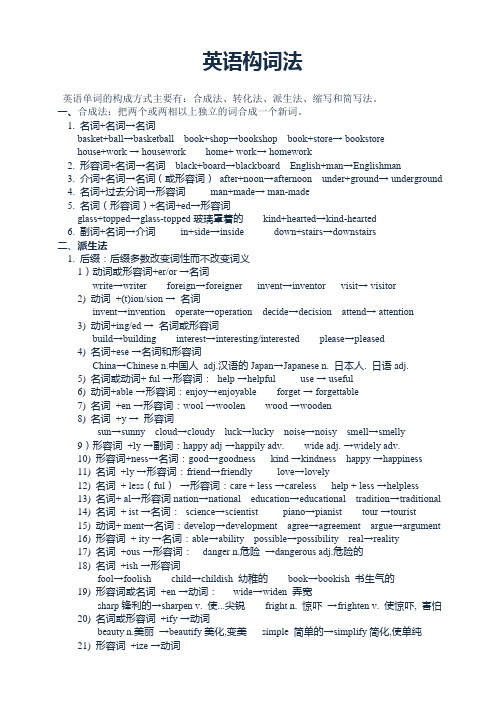
英语构词法英语单词的构成方式主要有:合成法、转化法、派生法、缩写和简写法。
一、合成法:把两个或两相以上独立的词合成一个新词。
1. 名词+名词→名词basket+ball→basketball book+shop→bookshop book+store→ bookstorehouse+work → housework home+ work→ homework2. 形容词+名词→名词black+board→blackboard English+man→Englishman3. 介词+名词→名词(或形容词)after+noon→afternoon under+ground→ underground4. 名词+过去分词→形容词man+made→ man-made5. 名词(形容词)+名词+ed→形容词glass+topped→glass-topped玻璃罩着的kind+hearted→kind-hearted6. 副词+名词→介词in+side→inside down+stairs→downstairs二、派生法1. 后缀:后缀多数改变词性而不改变词义1)动词或形容词+er/or →名词write→writer foreign→foreigner invent→inventor visit→ visitor2) 动词+(t)ion/sion → 名词invent→invention operate→operation decide→decision attend→ attention3) 动词+ing/ed → 名词或形容词build→building interest→interesting/interested please→pleased4) 名词+ese →名词和形容词China→Chinese n.中国人adj.汉语的Japan→Japanese n. 日本人. 日语adj.5) 名词或动词+ ful →形容词:help →helpful use → useful6) 动词+able →形容词:enjoy→enjoyable forget → forgettable7) 名词+en →形容词:wool →woolen wood →wooden8) 名词+y → 形容词sun→sunny cloud→cloudy luck→lucky noise→noisy smell→smelly 9)形容词+ly →副词:happy adj →happily adv. wide adj. →widely adv.10) 形容词+ness→名词:good→goodness kind →kindness happy →happiness11) 名词+ly →形容词:friend→friendly love→lovely12) 名词+ less(ful)→形容词:care + less →careless help + less →helpless13) 名词+ al→形容词nation→national education→educational traditio n→traditional14) 名词+ ist →名词:science→scientist piano→pianist tour →tourist15) 动词+ ment→名词:develop→development agree→agreement argue→argument16) 形容词+ ity →名词:able→ability possible→possibility real→reality17) 名词+ous →形容词:danger n.危险→dangerous adj.危险的18) 名词+ish →形容词fool→foolish child→childish 幼稚的book→bookish书生气的19) 形容词或名词+en →动词:wide→widen 弄宽sharp锋利的→sharpen v. 使...尖锐fright n. 惊吓→frighten v. 使惊吓, 害怕20) 名词或形容词+ify →动词beauty n.美丽→beautify美化,变美simple 简单的→simplify简化,使单纯21) 形容词+ize →动词real真的→realize了解, 实现memory n.记忆力→memorize v.记忆22) 动词+tive →形容词act行为→active adj. 积极的attract 吸引→attractive adj. 有吸引力的23)动词+ess →名词(女性)host主持→hostess女主人act扮演→actress女演员wait→waitress女侍者24)构成数词的后缀有-teen (十几),-ty (几十),-th (构成序数词)six六→sixteen十六→sixteenth第十六,four四→forty四十→fortieth第四十2. 前缀(前缀一般只改变词的意思而不改变其词性):1) un- (不,非,表示否定,形容词前缀)happy (高兴的) → unhappy(不高兴的)like (像) → unlike(不像)2) im- (不,无,非,表示否定,形容词前缀,常用在p, b, m开头的单词前)possible (可能的) → impossible(不可能的)polite → impolite3) in- (不,无,非,表示否定,形容词前缀)active →inactive complete →incomplete 不完全的4) dis-(不,非,表示否定,动词或形容词或名词前缀)honest→dishonest agree→disagree advantage优势→disadvantage不利5) mis- (表示错误):understand →misunderstand (误解) mistake (错误), misuse (误用)6) re- (再,重复):tell 叙述→ retell复述build 建筑→ rebuild 重建write →rewrite7) inter- (相互、交互、在一起):interview, international, internet8) kilo- (千):meter 米→kilometer 公里,千米gram 克→kilogram 千克9) micro- (微,小):microwave oven 微波炉microcomputer 微型电脑三、转化法:而无须借助词缀,就实现词类的转化。
【高一同步教程】高中英语必修4 Unit5语法:构词法讲解及练习

高中英语必修4 Unit 5语法教学案Section ⅢGrammar—构词法语法图解【探究发现】①chairman主席newspaper报纸hometown 家乡airport 机场sunrise 日出②dislike 不喜欢incorrect 不正确的unlucky 不走运的retell 复述telephone 电话③reader 读者inventor 发明家Chinese 中国人Indian 印度人artist 艺术家kindness 和蔼operation 手术④water 水/浇水dry 干的/弄干book 书籍/预订nurse 护士/护理better 更好/改善[我的发现](1) ①组中的单词是将两个单词合并在一起,形成一个新的单词。
这种构词法被称之为合成法。
(2) ②组中的单词都是在各自的词根前加了不同的前缀,如dis-,in-,un-,re-,tele-等。
(3) ③组中的单词是在各自的词根后加了不同的后缀,如-er, -or, -ese, -ian等。
(4) ②③组中单词的构词法被称之为派生法。
(5) ④组中的单词所展示的构词法被称之为转化法。
英语中词的构成方法主要有三种:合成、派生和转化。
一、合成由两个或更多的词合成一个词,有的用连字符“-”连接,有的直接写在一起,还有的由分开的两个词构成。
1.合成名词构成方式举例构成方式举例名词+名词weekend周末动词+名词postcard明信片名词+动词daybreak破晓动词-ing+名词waiting-room候车室名词+动词-ing handwriting书法形容词+名词fastfood 快餐构成方式举例构成方式举例名词+动词-ing English-speaking讲英语的形容词+名词part-time兼职的名词+动词-ed state-owned国有的形容词+动词-ing good-looking相貌好的副词+动词-ed widespread分布广的形容词+名词+-ed warm-hearted热心的构成方式举例构成方式举例形容词+名词sometimes有时副词+名词indoors在室内介词+名词alongside在一边副词+介词nearby附近4.构成方式举例代词宾格+self herself她自己himself他自己物主代词+self myself我自己yourself你自己形容词+名词anything任何东西somebody某个人5.合成动词构成方式举例名词+动词sunbathe晒太阳typewrite打字形容词+动词whitewash粉刷safeguard保卫副词+动词overthrow推翻upset使生气[名师点津](1) 合成词的复数形式通常是把前面的主体名词变复数。
初高中英语词汇构词法详解
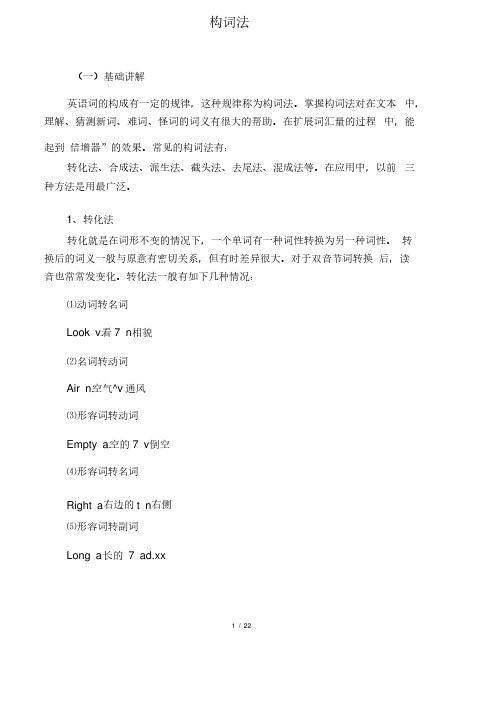
构词法(一)基础讲解英语词的构成有一定的规律,这种规律称为构词法。
掌握构词法对在文本中,理解、猜测新词、难词、怪词的词义有很大的帮助。
在扩展词汇量的过程中,能起到倍增器”的效果。
常见的构词法有:转化法、合成法、派生法、截头法、去尾法、混成法等。
在应用中,以前三种方法是用最广泛。
1、转化法转化就是在词形不变的情况下,一个单词有一种词性转换为另一种词性。
转换后的词义一般与原意有密切关系,但有时差异很大。
对于双音节词转换后,读音也常常发变化。
转化法一般有如下几种情况:⑴动词转名词Look v.看7 n相貌⑵名词转动词Air n.空气空气^v通风⑶形容词转动词Empty a.空的空的7 v倒空⑷形容词转名词Right a右边的t n右侧⑸形容词转副词Long a 长的长的7 ad.xx1 / 22、合成法就是将两个或两个以上的词合成的一个新词。
合成词各个成分之 间有的要用连字2、合成法就是将两个或两个以上的词合成的一个新词。
合成词各个成分之符连接,有的直接连在一起。
符连接,有的直接连在一起。
、派生法是在一个词根的前面或后面加上某个词缀来产生新词。
加在前 面的叫前缀,加3、派生法是在一个词根的前面或后面加上某个词缀来产生新词。
加在前在后面的词缀叫做后缀。
在后面的词缀叫做后缀。
前缀多引起词义的变化而不改变词性。
后缀对词性、词义都可能有影响。
前缀多引起词义的变化而不改变词性。
后缀对词性、词义都可能有影响。
例如:例如:前缀词根后缀dis agree ment (不同意n .)前缀词根后缀、截短法(缩略法)截短法,即将单词缩写,词义和词性保持不变,主要有 截头、去尾、4、截短法(缩略法)截短法,即将单词缩写,词义和词性保持不变,主要有截头去尾等形式。
截头去尾等形式。
⑴截头 telephone t phone aeroplane t plane⑴截头omnibus bus⑵去尾⑵去尾mathematics t mathsco-operate c o pexamination examkilogram kilolaboratory labtaxicab taxi⑶截头去尾⑶截头去尾influenza flurefrigerator fridgeprescription script5、混合法(混成法)、混合法(混成法)混合法,即将两个词混合或各取一部分紧缩而成一个新词。
高中语法:12-构词法(含答案)
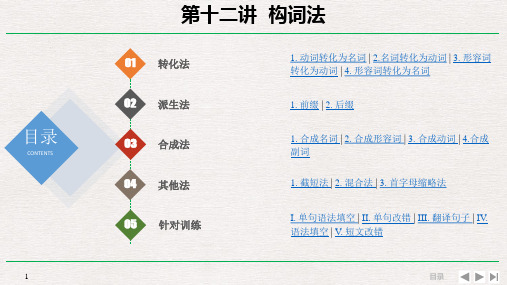
CONTENTS
1
第十二讲 构词法
01 转化法 02 派生法 03 合成法 04 其他法 05 针对训练
1. 动词转化为名词 | 2.名词转化为动词 | 3. 形容词 转化为动词 | 4. 形容词转化为名词
1. 前缀 | 2. 后缀
1. 合成名词 | 2. 合成形容词 | 3. 合成动词 | 4.合成 副词
7
目录
PART TWO
派生法
8
二、派生法
在词根前面加前缀或在词根后面加后缀构成一个与原单词意义相近或截然相反的新 词叫作派生法。除少数前缀外,前缀一般改变单词的意义,不改变词性;后缀一般 改变词类,很少引起词义的变化。
9
目录
二、派生法
1 前缀
(1)表示否定意义的前缀
常见的有dis,un-,im-,in-,il,ir,mis,non 等,在单词的前面加这类前缀常
1. 截短法 | 2. 混合法 | 3. 首字母缩略法
I. 单句语法填空 | II. 单句改错 | III. 翻译句子 | IV. 语法填空 | V. 短文改错
目录
转化法
PART ONE
2
一、 转化法
英语中,有的名词可作动词,有的形容词可作副词或动词,这种把一种词性用 作另一种词性而词形不变的方法叫做转化法。
28
目录
针对训练
29
Ⅰ. 单句语法填空
1.Recent studies show that we are far more productive at work if we take short breaks ___r_e_g_u_l_a_rl_y____ (regular).(2016·全国卷Ⅱ) 2.In addition to their simple beauty,what makes the adobe dwellings admirable is their _____a_b_il_it_y_____ (able) to “air condition” a house without using electric equipment.(2015·全国卷Ⅱ) 3 . The river was so polluted that it ____a_c_t_u_a_ll_y____ (actual) caught fire and burned.(2014·全国卷Ⅰ) 4.There were many people waiting at the bus stop,and some of them looked very anxious and __d_is_a_p_p_o_i_n_t_e_d__ (disappoint).(2014·全国卷Ⅱ) 5.___O__b_v_io_u_s_l_y___ (obvious),the story is not true,but the festival is interesting.
高中英语语法专题一: 英语语法框架 句子成分讲解和练习(word版 含答案)
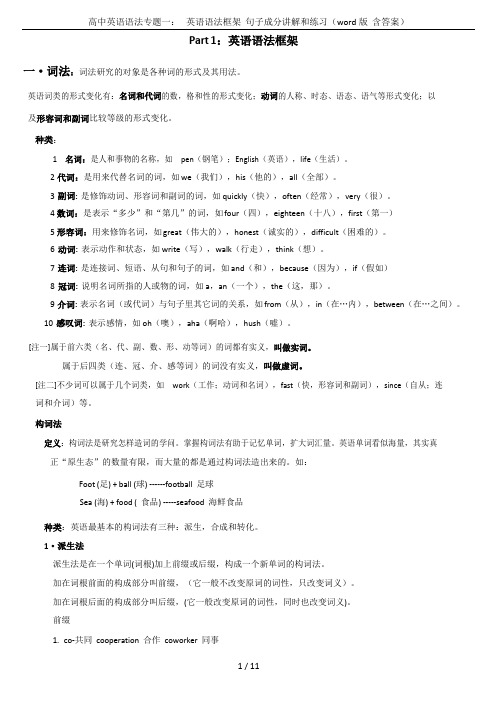
Part 1:英语语法框架一·词法:词法研究的对象是各种词的形式及其用法。
英语词类的形式变化有:名词和代词的数,格和性的形式变化;动词的人称、时态、语态、语气等形式变化;以及形容词和副词比较等级的形式变化。
种类:1 名词:是人和事物的名称,如pen(钢笔);English(英语),life(生活)。
2 代词:是用来代替名词的词,如we(我们),his(他的),all(全部)。
3 副词: 是修饰动词、形容词和副词的词,如quickly(快),often(经常),very(很)。
4 数词:是表示“多少”和“第几”的词,如four(四),eighteen(十八),first(第一)5 形容词:用来修饰名词,如great(伟大的),honest(诚实的),difficult(困难的)。
6 动词: 表示动作和状态,如write(写),walk(行走),think(想)。
7 连词: 是连接词、短语、从句和句子的词,如and(和),because(因为),if(假如)8 冠词: 说明名词所指的人或物的词,如a,an(一个),the(这,那)。
9 介词: 表示名词(或代词)与句子里其它词的关系,如from(从),in(在…内),between(在…之间)。
10 感叹词: 表示感情,如oh(噢),aha(啊哈),hush(嘘)。
[注一]属于前六类(名、代、副、数、形、动等词)的词都有实义,叫做实词。
属于后四类(连、冠、介、感等词)的词没有实义,叫做虚词。
[注二]不少词可以属于几个词类,如work(工作;动词和名词),fast(快,形容词和副词),since(自从;连词和介词)等。
构词法定义:构词法是研究怎样造词的学问。
掌握构词法有助于记忆单词,扩大词汇量。
英语单词看似海量,其实真正“原生态”的数量有限,而大量的都是通过构词法造出来的。
如:Foot (足) + ball (球) ------football 足球Sea (海) + food ( 食品) -----seafood 海鲜食品种类:英语最基本的构词法有三种:派生,合成和转化。
(高中英语2019版) 基础保分篇 第八讲 构词法讲与练 新人教版(含答案)
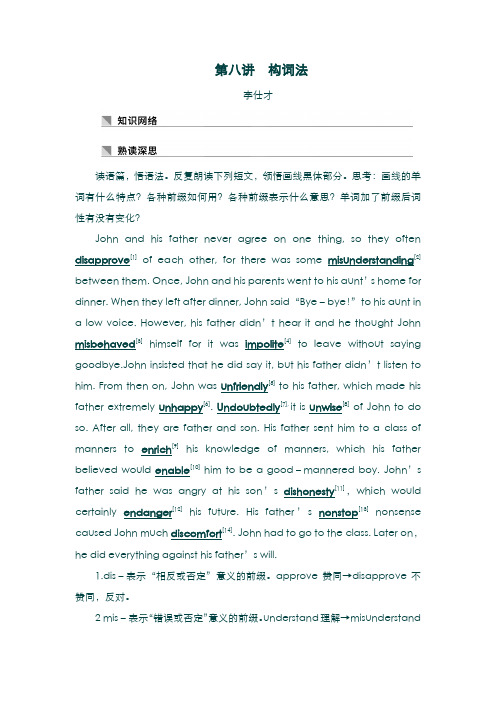
第八讲构词法李仕才读语篇,悟语法。
反复朗读下列短文,领悟画线黑体部分。
思考:画线的单词有什么特点?各种前缀如何用?各种前缀表示什么意思?单词加了前缀后词性有没有变化?John and his father never agree on one thing, so they often disapprove[1]of each other, for there was some misunderstanding[2] between them. Once, John and his parents went to his aunt’s home for dinner. When they left after dinner, John said “Bye-bye!”to his aunt in a low voice. However, his father didn’t hear it and he thought John misbehaved[3]himself for it was impolite[4]to leave without saying goodbye.John insisted that he did say it, but his father didn’t listen to him. From then on, John was unfriendly[5] to his father, which made his father extremely unhappy[6]. Undoubtedly[7], it is unwise[8] of John to do so. After all, they are father and son. His father sent him to a class of manners to enrich[9]his knowledge of manners, which his father believed would enable[10]him to be a good-mannered boy. John’s father said he was angry at his son’s dishonesty[11],which would certainly endanger[12]his future. His father’s nonstop[13]nonsense caused John much discomfort[14]. John had to go to the class. Later on,he did everything against his father’s will.1.dis-表示“相反或否定”意义的前缀。
英语高考考点---名词的构词法及练习(有答案)
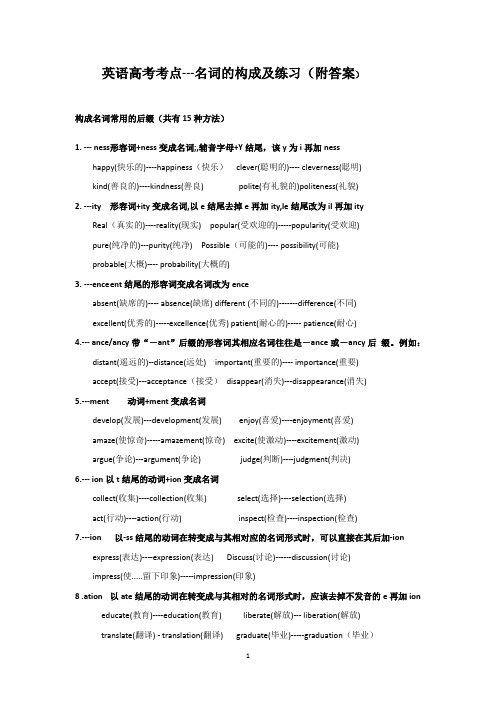
英语高考考点---名词的构成及练习(附答案)构成名词常用的后缀(共有15种方法)1. --- ness形容词+ness变成名词;,辅音字母+Y结尾,该y为i再加nesshappy(快乐的)----happiness(快乐)clever(聪明的)---- cleverness(聪明)kind(善良的)----kindness(善良) polite(有礼貌的)politeness(礼貌)2. ---ity形容词+ity变成名词,以e结尾去掉e再加ity,le结尾改为il再加ityReal(真实的)----reality(现实) popular(受欢迎的)-----popularity(受欢迎)pure(纯净的)---purity(纯净) Possible(可能的)---- possibility(可能)probable(大概)---- probability(大概的)3.---ence e nt结尾的形容词变成名词改为enceabsent(缺席的)---- absence(缺席) different (不同的)-------difference(不同)excellent(优秀的)-----excellence(优秀) patient(耐心的)----- patience(耐心)4.--- ance/ancy带“-ant”后缀的形容词其相应名词往往是-ance或-ancy后缀。
例如:distant(遥远的)--distance(远处) important(重要的)---- importance(重要)accept(接受)---acceptance(接受)disappear(消失)---disappearance(消失)5.---ment 动词+ment变成名词develop(发展)---development(发展) enjoy(喜爱)----enjoyment(喜爱)amaze(使惊奇)-----amazement(惊奇) excite(使激动)----excitement(激动)argue(争论)---argument(争论) judge(判断)----judgment(判决)6.--- ion以t结尾的动词+ion变成名词collect(收集)----collection(收集) select(选择)----selection(选择)act(行动)----action(行动) inspect(检查)----inspection(检查)7.---ion 以-ss结尾的动词在转变成与其相对应的名词形式时,可以直接在其后加-ionexpress(表达)----expression(表达) Discuss(讨论)------discussion(讨论)impress(使.....留下印象)-----impression(印象)8 .ation以ate结尾的动词在转变成与其相对的名词形式时,应该去掉不发音的e再加ioneducate(教育)----education(教育) liberate(解放)--- liberation(解放)translate(翻译) - translation(翻译) graduate(毕业)-----graduation(毕业)9.tion以元音字母+辅音字母+e结尾的动词在转换成名词时,通常的做法是先将e改成a然后在其后加-tion(这样做的原因是字母a的读音ei 会使这个词读起来上口)admire(羡慕)---admiration(羡慕) recite(背诵)----- recitation(背诵)prepare(准备)----preparation(准备) invite(邀请)-----invitation(邀请)10 ---sion以de结尾的动词,在转变成与其对应的名词时,去掉字母组合de再加上siondecide(决定)----decision((决定) divide(分开)-----division(分开)provide(提供)----provision(提供) conclude(推断)-conclusion(推论)11. ---ssion以重读闭音节结尾的动词,在转变成与其对应的名词时,先将词尾t,然后再加-ssionadmit(准许)----admission(入场费)permit(许可)----permission(允许)12. ---hoodchild(孩子)----childhood(孩童时期) neighbour(邻居)----neighbourhood(邻居关系)mother(母亲)----motherhood(母亲的身份) brother(兄弟)---brotherhood(兄弟关系) 13.---shipfriend(朋友)---friendship(友谊) relation(关系)--relationship(关系)scholar(学者)---scholarship(学者) citizen(公民)-----citizenship(公民身份)14.---ingfeel(感到,摸)---feeling(感觉) build(建设)---building(建筑物)meet(集合)-----meeting(会议) hear(听)----hearing(听力)15.---thdeep(深的)----depth(深度) wide(宽的)----width(宽度)long(长的)----length(长度) strong(强大的)----strength(力量,强度)一、将下列动词转换为名词。
(2021年整理)英语构词法讲解及专项练习

英语构词法讲解及专项练习编辑整理:尊敬的读者朋友们:这里是精品文档编辑中心,本文档内容是由我和我的同事精心编辑整理后发布的,发布之前我们对文中内容进行仔细校对,但是难免会有疏漏的地方,但是任然希望(英语构词法讲解及专项练习)的内容能够给您的工作和学习带来便利。
同时也真诚的希望收到您的建议和反馈,这将是我们进步的源泉,前进的动力。
本文可编辑可修改,如果觉得对您有帮助请收藏以便随时查阅,最后祝您生活愉快业绩进步,以下为英语构词法讲解及专项练习的全部内容。
构词法Word Formation在英语中,词的构成方式主要有三种:合成、转化和派生。
一、合成 Compounding 两个或更多的词合成一个词。
方式:1. 直接写在一起. 2。
用连字符(—)连接。
3. 由两个分开的词构成.(1) 合成形容词(2)合成动词(3)合成名词(4)合成副词however, maybe, wherever, whenever, forever(5)合成代词whoever,, whatever, everyone, nobody, myself, something,anything,二、派生 Derivation 前缀后缀注意: -ese, —ian, —ist 既可以构成名词,又可以构成形容词.-er 构成的名词,既有表示人的,又有表示物的。
三、转化 Conversion:指一个词不变化词形,而由一种此类转化为另一种词类或几种词类。
1。
名词和动词之间的转化telephone电话——打电话, mirror镜子——像镜子一样反映, drink喝--饮料,record录音——记录, name, date, hand, study,2. 形容词转化为动词 perfect完美的-—使完善3.名词转化为形容词(副词) front前面——前面的4.形容词转化为名词 chief 主要的-—首领语法填空之构词法专项练习1。
The soldier died for saving the child,so his________(die) is heavier than Mount Tai.2. The Great Wall is more than 6000 li in ________(long).3. How________ (fool) he is!4。
高中英语构词法教案、说课稿、课堂练习
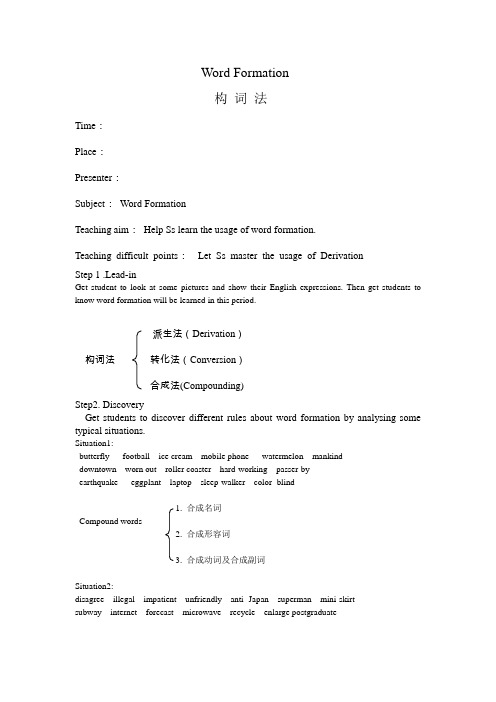
Word Formation构词法Time:Place:Presenter:Subject:Word FormationTeaching aim:Help Ss learn the usage of word formation.Teaching difficult points:Let Ss master the usage of DerivationStep 1 .Lead-inGet student to look at some pictures and show their English expressions. Then get students to know word formation will be learned in this period.派生法(Derivation)构词法转化法(Conversion)合成法(Compounding)Step2. DiscoveryGet students to discover different rules about word formation by analysing some typical situations.Situation1:butterfly football ice cream mobile phone watermelon mankinddowntown worn out roller coaster hard-working passer-byearthquake eggplant laptop sleep-walker color- blind1. 合成名词Compound words2. 合成形容词3. 合成动词及合成副词Situation2:disagree illegal impatient unfriendly anti- Japan superman mini-skirtsubway internet forecast microwave recycle enlarge postgraduateteacher artist imagination happiness purify humorous lengthen comfortable thankful homeless carefullyStep3. PracticeDivide students into groups to finish the following exercise.(1). Write out the original words.dislike v. ________impossibility n. ________unfriendly adj.__________misunderstanding n. _______translator n. ________(2). 按括号内的要求改写下列单词agree(反义)_____ nation(形容词)_____farm(人)________ recent(副词)________friend(形容词)________ hope(形容词)_____home(形容词) ________ true(名词)_______amuse(名词)_______ attract(形容词)_____(3).写出所给单词的正确形式。
高中英语 高考真题中的构词法与巩固练习
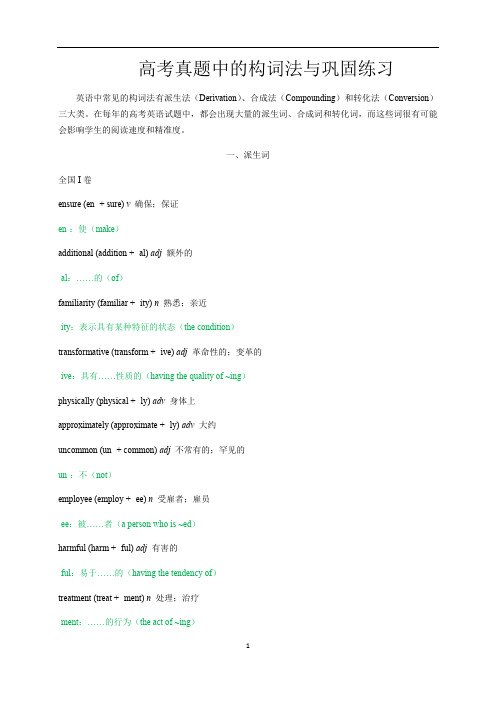
高考真题中的构词法与巩固练习英语中常见的构词法有派生法(Derivation)、合成法(Compounding)和转化法(Conversion)三大类。
在每年的高考英语试题中,都会出现大量的派生词、合成词和转化词,而这些词很有可能会影响学生的阅读速度和精准度。
一、派生词全国I卷ensure (en- + sure) v确保;保证en-:使(make)additional (addition + -al) adj额外的-al:……的(of)familiarity (familiar + -ity) n熟悉;亲近-ity:表示具有某种特征的状态(the condition)transformative (transform + -ive) adj革命性的;变革的-ive:具有……性质的(having the quality of ~ing)physically (physical + -ly) adv 身体上approximately (approximate + -ly) adv大约uncommon (un- + common) adj不常有的;罕见的un-:不(not)employee (employ + -ee) n受雇者;雇员-ee:被……者(a person who is ~ed)harmful (harm + -ful) adj有害的-ful:易于……的(having the tendency of)treatment (treat + -ment) n处理;治疗-ment:……的行为(the act of ~ing)empower (em- + power) v授权;使能够em- (=en-):使(make)apparently (apparent + -ly) adv显然地merely (mere + -ly) adv仅仅;只不过absolutely (absolute + -ly) adv绝对地;完全地unreasonable (un- + reasonable) adj不合理的un-:不(not)repeatedly (repeated + -ly) adv重复地;再三地temporarily (temporary + -ly) adv暂时地casually (casual + -ly) adv偶然地;随意地extremely (extreme + -ly) adv极其;非常全国II卷inspirational (inspiration + -al) adj启发灵感的-al:有……性质的(having the nature of)psychologist (psychology + -ist) n心理学家-ist:从事……的专家predictor (predict + -or) n有预测作用的事物-or:……物(a thing that ~s)developmental (development + -al) adj发展的-al:……的(of)environmentalist (environmental + -ist) n环保主义者-ist:……主义者ecologist (ecology + -ist) n生态学家ecosystem (eco- + system) n生态系统eco-:生态(abstracted from “ecology”)biologist (biology + -ist) n生物学家risky (risk + -y) adj冒险的-y:有……特征的(characterized by)wonderment (wonder + -ment) n 惊奇;惊喜-ment:the state of ~ing(……的状况)excitement (excite + -ment) n 激动;兴奋-ment:the state of ~ing(……的状况)novelist (novel + -ist) n 小说家announcement (announce + -ment) n 宣布;宣告-ment:the act of ~ing(……的行为)uneasy (un- + easy) adj 不自在的;忧虑的-un:不(not)soften (soft + -en) v使变温和-en:使(cause to be)enable (en- + able) v使能够en-:使(make)conversational (conversation + -al) adj交谈的;谈话的-al:……的(of)certainly (certain + -ly) adv必然;肯定地renewal (renew + -al) n恢复;更新-al:……行为(the act of ~ing)surely (sure + -ly) adv一定;必定;想必全国III卷tasty (taste + -y) adj 美味的-y:有……特征的(characterized by)enrich (en- + rich) v丰富en-:使(make)treasury (treasure + -y) n宝库exceptional (exception + -al) adj非凡的multigenerational (multi- + generation + -al) adj多代的multi-:多的(many)traditionally (traditional + -ly) adv历来coastal (coast + -al) adj近海的;沿海的characteristic (character + -istic) n特征;特色;特点registry (register + -y) n登记处unpack (un- + pack) v打开(盒子、包或手提箱等)取出(物品)un-:取走(to remove)speechless (speech + -less) adj 说不出话的-less:无(without)milky (milk + -y) adj 奶制的;像奶的-y:多……的(full of)gently (gentle + -ly) adj 温柔地;温和地effectiveness (effective + -ness) n有效性-ness:……的性质或状态(the quality or condition of being)guidance (guide + -ance) n指导;引导-ance:……的行为(the act of ~ing)popularity (popular + -ity) n受欢迎;普及;流行-ity:……的状态(the condition of)浙江卷meaningful (meaning + -ful) adj有意义的-ful:充满……的(full of)widen (wide + -en) v(使)变宽-en:使(cause to be)analytical (analytic + -al) adj分析的managerial (manager + -ial) adj管理的multitasking (multi- + task + -ing) n同时做几件事情multi-:多的(many)environmental (environment + -al) adj环境的;环保的loneliness (lonely + -ness) n孤独-ness:……的性质或状态(the quality or condition of being)helpful (help + -ful) adj有帮助的;有益的-ful:充满……的(full of)colorful (color + -ful) adj颜色鲜艳的;五彩缤纷的-ful:充满……的(full of)machinery (machine + -ery) n机器;机械-ery:……的群体或集体(a group of ~s)山东卷disqualification (dis- + qualify + -tion) n取消资格dis-:取消(undo)warmth (warm + -th) n温暖;热情-th:……的性质或状态(the quality or condition of being)architectural (architecture + -al) adj建筑学的;建筑方面的sadden (sad + -en) v使悲哀;使悲痛-en:使(cause to be)reportage (report + -age) n事件报道-age:……行为(the act or of ~ing)eventful (event + -ful) adj多事故的;经历丰富的-ful:充满……的(full of)viewership (viewer + -ship) n(电视节目或频道的)观众人数;观众类型-ship:……的数量(the number of ~s)significantly (significant + -ly) adv显著地;明显地extremely (extreme + -ly) adv非常;极其overweight (over- + weight) adj超重的over-:过多(too much)earthen (earth + -en) adj陶制的-en:由……制成的(be made of)二、合成词全国I卷timetable (time + table) n时刻表wheelchair (wheel + chair) n轮椅workplace (work + place) n工作场所houseplant (house + plant) n室内盆栽植物groundwater (ground + water) n地下水lifetime (life + time) n 一生;终生daylight (day + light) n日光highway (high + way) 公路;大道onboard (on + board) adj在船(或飞机、车)上的全国II卷award-winning (award + winning) adj获奖的parkland (park + land) n(如乡村大宅院周围的)有草木的开阔地fine art (fine + art) n 美术(尤指绘画和雕塑)math-related (math + related) adj与数学相关的high-income (high + income) adj高收入的self-control (self + control) n 自制力showcase (show + case) v展示guilt-free (guilt + free) adj没有负罪感的wetland (wet + land) n湿地;沼泽outcome (out + come) n结果全国III卷footstep (foot + step) n脚步声;足迹waterway (water + way) n水路;航道in-depth (in + depth) adj彻底的;渗入详尽的underground (under + ground) adj地下的fur-coat-wearing (fur + coat + wearing) adj穿毛皮大衣的full-body (full + body) adj 全身的filmmaker (film + maker) n电影制作人realistic-looking (realistic + looking) adj逼真的off-set (off + set) adj在拍摄场外的doorway (door + way) n门口;门道mother-in-law (mother + in + law) n岳母;婆婆standpoint (stand + point) n观点;立场household (house + hold) n一家人;家庭carefree (care + free) adj 无忧无虑的;无牵挂的;无责任的highland (high + land) n高地;高原houseboat (house + boat) n船屋shellfish (shell + fish) n(尤指可以吃的)水生有壳动物underwater (under + water) adv 在水下;在水中housewarming (house + warming) n乔迁聚会firewood (fire + wood) n柴火;木柴businesswoman (business + woman) n女商人;女企业家handbag (hand + bag) n手提包shopkeeper (shop + keeper) n店主salesperson (sale + person) n售货员lifelike (life + like) adj 逼真的;生动的;栩栩如生的masterpiece (master + piece) n杰作;名著;代表作waterfall (water + fall) n瀑布浙江卷playgoer (play + goer) n经常去戏院看戏的人;爱看戏的人play-reader (play + reader) n(为出版商、演出人或剧团等阅读并评价剧本的)剧本读评人houselight (house + light) n 剧院灯光cure-all (cure + all) n 万灵药;灵丹妙药overall (over + all) adj全面的teamwork (team + work) n 协作;配合decision-making (decision + making) n决策high-level (high + level) adj高级的babysit (baby + sit) v代人临时照看小孩cardboard (card + board) n硬纸板leftover (left + over) adj剩余的lifelong (life + long) adj终身的;毕生的motorway (motor + way) n高速公路山东卷round-trip (round + trip) adj 来回旅程的willpower (will + power) n 意志力first-generation (first + generation) adj第一代的well-rounded (well + rounded) adj全面的intake(in + take) n(食物等的)摄取量undergraduate (under + graduate) n本科生daytime(day + time) n白天rainwater (rain + water) n雨水naturally-grown(naturally + grown) adj 自然生长的postcard (post + card) n 明信片三、转化词全国I卷However, race walking does not pound the body as much as running does.pound v [名词动词化] 连续重击We’re thinking about how we can engineer plants to replace functions of the things that we use every day.engineer v [名词动词化] 改变(动植物等的)基因结构The technology, Strano said, could one day be used to light the rooms.light v [名词动词化] 照亮全国II卷It was a special time to bond with my children.bond v [名词动词化](与某人)培养一种特殊的关系Frequent them and talk about them when you can.frequent v [形容词动词化] 常去;常到The plum trees are the first to flower even as the snow is melting.flower v [名词动词化] 开花全国III卷Discover the China of “past ages,” its walled cities, temples and mountain scenery with Prof. Robert Thorp.wall v [名词动词化] 用墙把……围住The creative team ... and later processes it with computer graphics to create a final image(图像).process v [名词动词化] 处理And there are questions about the films ... are not monitored as closely as productions filmed in the States.film v [名词动词化](把……)拍成电影The Bajau, as these people are known, number in the hundreds of thousands in Indonesia, Malaysia and the Philippines.number v [名词动词化] 总计They made a living as divers, spearfishing or harvesting shellfish.harvest v [名词动词化] 捕猎(动物、鱼等)浙江卷To get the most out of reading these plays, try to picture the play on stage.picture v [名词动词化] 想象;设想Challenging work that requires ... might help your brain stay sharp as you age.age v [名词动词化] 变老My brother, of course, raced off to be with his friends, while I had plenty to do myself.race v [名词动词化] 快速移动They’re all memories I treasure today.treasure v [名词动词化] 珍惜;珍视I’ve been farming sheep on a hillside for 54 years.farm v [名词动词化] 饲养山东卷Watering young plants in the dry season was tough for a lone boy.water v [名词动词化] 给(植物)浇水如果你还不满足于只学不练,别着急,小编为你量身打造了检测小卷,希望你能小试身手,一气呵成。
2021年高考英语语法必考考点(15)构词法(含解析)练习
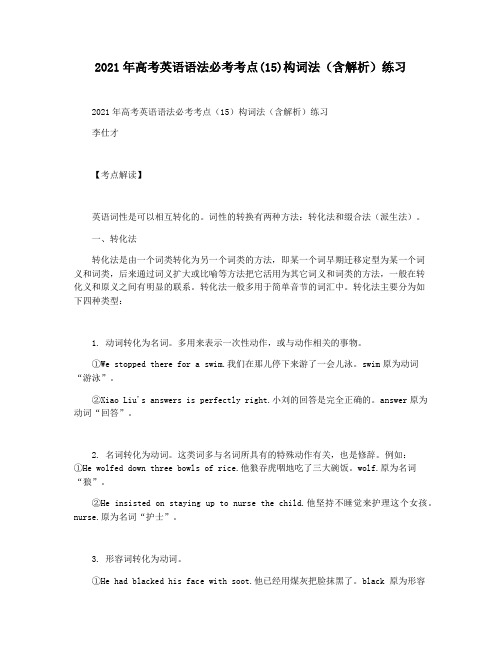
2021年高考英语语法必考考点(15)构词法(含解析)练习2021年高考英语语法必考考点(15)构词法(含解析)练习李仕才【考点解读】英语词性是可以相互转化的。
词性的转换有两种方法:转化法和缀合法(派生法)。
一、转化法转化法是由一个词类转化为另一个词类的方法,即某一个词早期迁移定型为某一个词义和词类,后来通过词义扩大或比喻等方法把它活用为其它词义和词类的方法,一般在转化义和原义之间有明显的联系。
转化法一般多用于简单音节的词汇中。
转化法主要分为如下四种类型:1. 动词转化为名词。
多用来表示一次性动作,或与动作相关的事物。
①We stopped there for a swim.我们在那儿停下来游了一会儿泳。
swim原为动词“游泳”。
②Xiao Liu's answers is perfectly right.小刘的回答是完全正确的。
answer原为动词“回答”。
2. 名词转化为动词。
这类词多与名词所具有的特殊动作有关,也是修辞。
例如:①He wolfed down three bowls of rice.他狼吞虎咽地吃了三大碗饭。
wolf.原为名词“狼”。
②He insisted on staying up to nurse the child.他坚持不睡觉来护理这个女孩。
nurse.原为名词“护士”。
3. 形容词转化为动词。
①He had blacked his face with soot.他已经用煤灰把脸抹黑了。
black 原为形容1 / 16词“黑色的”。
②My father is emptying a box of rubbish into a rubbish-cart.我爸爸正将垃圾倒入垃圾车。
empty原为形容词“空的”。
4. 形容词转化为名词。
即用性质来指代这种性质的事物。
例如:①My mother likes red.我妈妈喜欢红色(的)。
red原为形容词“红色的”。
②The Chinese are working-hard and brave people.人勤劳而勇敢。
高中英语词汇构词法分析练习题50题

高中英语词汇构词法分析练习题50题1. My brother is a bookworm. He loves to read in his free time. The underlined word “bookworm” is a(an) _____.A.noun + nounB.verb + nounC.adjective + nounD.adverb + noun答案:A。
“bookworm”由“book(书)”和“worm(虫子)”两个名词组成,是一个合成词,意思是“书呆子”。
选项 A 是名词加名词;选项B 是动词加名词;选项C 是形容词加名词;选项D 是副词加名词。
2. The blackboard is very important in the classroom. The underlined word “blackboard” is a(an) _____.A.noun + nounB.verb + nounC.adjective + nounD.adverb + noun答案:A。
“blackboard”由“black( 黑色的)”和“board( 板)”两个名词组成,是一个合成词,意思是“黑板”。
选项 A 是名词加名词;选项B 是动词加名词;选项C 是形容词加名词;选项D 是副词加名词。
3. The firefighter is very brave. He saves people from fire. Theunderlined word “firefighter” is a(an) _____.A.noun + nounB.verb + nounC.adjective + nounD.adverb + noun答案:A。
“firefighter”由“fire( 火)”和“fighter( 战士)”两个名词组成,是一个合成词,意思是“消防员”。
选项 A 是名词加名词;选项B 是动词加名词;选项C 是形容词加名词;选项D 是副词加名词。
高中英语构词法讲解

高中英语构词法讲解高中英语构词法讲解(一):转化法(conversion)在英语中,一个单词由一种词性转化为另一种或几种词性而词形不变的方法叫做转化法。
1. 动词转化为名词Let me have a try. 让我试试。
They are only allowed to sell soft drinks at school.在学校里只准许他们出售不含酒精的饮料。
2. 名词转化为动词He shouldered his way through the crowd.他用肩膀推开人群前进。
The smell from the kitchen made his mouth water.从厨房传来的气味使他流口水。
3. 形容词转化为动词We will try our best to better our living conditions.我们要尽力改善我们的生活状况。
They tried to perfect the working conditions.他们努力改善工作条件。
4. 形容词转化为名词He didnt know the difference between right and wrong.他不辨是非。
The old in our village are living a happy life.我们村的老年人过着幸福的生活。
5. 形容词转化为副词How long have you lived there?你在那儿住多久了?6. 个别词在一定场合中可转化为名词Warm clothes are a must in the mountains.穿暖和的衣服到山区去是必须的。
Life is full of ups and downs.人生有得意时也有失意时。
His argument contains too many ifs and buts.他的辩论中含有太多的如果和但是。
高中英语构词法讲解(二):合成法(composition)由两个或两个以上的单词连在一起合成一个新词,这种构词法叫做合成法,合成的词叫做合成词(compounds)。
高中英语构词法精讲ppt课件

m • kilogram→kilo • laboratory→lab • taxicab→taxi
• 3)截头去尾 • influenza→flu • refrigerator→fridg
e • prescription→scri
pt
32
5.混合法(混成法)
• -able (有能力的),-(a)n(某国人的),-en (多用于表示材料的名词后),-ern (方向的), -ese(某国人的),-ful,-(ic)al,-ish,-ive, -less (表示否定),-like (像……的),-ly,ous,-some,-y (表示天气)等。例如:
21
nature自然→natural自然的 reason道理→reasonable有道理的
7
4)副词转化为动词
• 有少数副词可以转化为动词。例如: • Murder will out.(谚语)恶事终必将
败露。
8
5)形容词转化为名词
• ①表示颜色的形容词常可转化为名词,如: • You should be dressed in black at the
funeral.你在葬礼中该穿黑色衣服。
America美国→American美国的 China中国→Chinese中国人的
gold金子→golden金的 east东→eastern东方的 child孩子→childish孩子气的
snow雪→snowy雪的 22
(4)构成副词的常用后缀有-ly (主要用于形容 词之后表示方式或程度),-ward(s) (主要用于 表示方位的词之后表示方向)。例如:
• see-through透明的
25
英语基本构词法知识点讲解

英语基本构词法知识点讲解构词法是研究词的内部结构和形成的学科,在英语学习中占据了重要的地位。
了解英语的构词法知识点能够帮助我们更好地理解、记忆和运用词汇。
本文将就英语的基本构词法知识点进行讲解。
一、构词法概述构词法是指研究词的构成和形变的规律,它主要涉及词根、前缀、后缀和词缀等。
通过对构词法的学习,我们可以了解到很多单词的内在含义和变形规则,从而更加灵活地运用词汇。
二、词根词根是单词的基本部分,是构成单词的核心,也是其他构词成分的基础。
词根通常没有变化,它们的意义比较稳定。
比如,“tele-”(远程)是一个常见的词根,可以在很多单词中找到,比如“telephone”(电话)、“television”(电视)等。
三、前缀前缀是附加在词根之前的构词成分,它可以改变词的意义或词性。
英语中有很多常见的前缀,比如“un-”(表示否定或相反)、“re-”(表示再次)、“dis-”(表示相反)等。
通过添加前缀,我们可以扩展词汇的含义和用法。
例如,“happy”(快乐的)添加前缀“un-”后变成“unhappy”(不快乐的)。
四、后缀后缀是附加在词根之后的构词成分,它可以改变词的词性、数目和形态等。
英语中有很多常见的后缀,比如“-er”(表示人或物体)、“-ful”(表示充满的)、“-ize”(表示使……化)等。
通过添加后缀,我们可以将一个词转变为名词、动词或形容词。
例如,“child”(孩子)添加后缀“-ish”后变成“childish”(孩子气的)。
五、词缀词缀是指前缀和后缀的统称,它们可以独立存在也可以相互结合。
词缀的运用可以让我们更加灵活地构造词汇,提高表达的准确度和多样性。
六、派生词派生词是指通过添加前缀、后缀或词缀而形成的新词。
在英语中,很多单词都是由其他单词派生而来的。
例如,“happiness”(幸福)由“happy”(快乐的)加后缀“-ness”(表示状态或品质)而成。
七、复合词复合词是由两个或更多个词组合而成的新词。
高中英语基本构词法及练习题

英语构词法中的派生法派生法:在词根加前缀或在词根后面加后缀构成一个与原单词意义相近或截然相反的新词叫作派生法。
一、前缀前缀一般改变单词的意义,不改变词性(除少数前缀外);后缀一般改变词类,而不引起词义的变化。
(1) 表示否定意义的前缀常用的有: dis-, il-, im-, in-, ir-, mis-, non-, un- 。
disable disadvantage disagreedisappeardisapprove disclose discolourdisconnectdiscontinuous discontinue discountdiscouragedisorderillegal impossible inaccurateinactive inadaptable inapplicable inconstant inconvenient incredibleincurable independent ineffective informal invisible irregularirremovable irrespectiveirresponsiblemisfortune misguide midinterpretmislead misread mistrust misunderstand misusenonmetal noncooperation noninvolvementunable unacceptable unaware unbalanceunbreakable uncertain unchangeableuncomfortable undecided unemployedundetermined undeveloped unearthuneconomicalunfold unpack untie(2) 表示其他意义的前缀常用的有:a.前缀 antianti-fascist anti-gas anti-imperialist anti-Japanese Warb.前缀 autoautobiography autographyc.前缀 bi-bicentury bilinguald.前缀 coco-operation coauthor coheire.前缀dedeform degrade devaluef.前缀 en- emenable encourage endangerenlarge enrich embitterg. 前缀 exex-soldier ex-girlfriend ex-wifeh.前缀 mid-midday midnight midterm mid-agedi.前缀 multi-multiform multilingual multimedia multipurposej. 21. 前缀 over-overcrowded overwork overload overproduceoverlook overcomek. 22.前缀 pre-prewar prehistoric prepaypreconditionl.前缀 re-rewrite review recyclem.前缀 vice-vice-chairman vice-governor vice-premier vice-president二、后缀后缀通常会改变单词的词性,构成意义相近的其他词性;少数后缀还会改变词义,变为与原来词义相反的新词。
关于高中英语构词法的必考考点剖析

关于高中英语构词法的必考考点剖析今天小编想和大家分享的是关于高中英语构词法的必考考点剖析,高三的同学要特别注意了,接下来就让我们一起来学习一下吧。
一. 转化法在英语中,一个单词由一种词性转化为另一种或几种词性而词形不变的方法叫做转化法。
1. 动词转化为名词●Let me have a try.让我试试。
●They are only allowed to sell soft drinks at school.在学校里只准许他们出售不含酒精的饮料。
2. 名词转化为动词●He shouldered his way through the crowd.他用肩膀推开人群前进。
●The smell from the kitchen made his mouth water.从厨房传来的气味使他流口水。
3. 形容词转化为动词●We will try our best to better our living conditions.我们要尽力改善我们的生活状况。
●They tried to perfect the working conditions.他们努力改善工作条件。
4. 形容词转化为名词●He didn’t know the difference between right and wrong.他不辨是非。
●The old in our village are living a happy life.我们村的老年人过着幸福的生活。
5. 形容词转化为副词●How long have you lived there?你在那儿住多久了?6. 个别词在一定场合中可转化为名词●Warm clothes are a must in the mountains.穿暖和的衣服到山区去是必须的。
●Life is full of ups and downs.人生有得意时也有失意时。
●His argument contains too many ifs and buts.他的辩论中含有太多的“如果”和“但是”。
- 1、下载文档前请自行甄别文档内容的完整性,平台不提供额外的编辑、内容补充、找答案等附加服务。
- 2、"仅部分预览"的文档,不可在线预览部分如存在完整性等问题,可反馈申请退款(可完整预览的文档不适用该条件!)。
- 3、如文档侵犯您的权益,请联系客服反馈,我们会尽快为您处理(人工客服工作时间:9:00-18:30)。
高中英语构词法讲解与练习一.类别英语构词法主要有:合成法,转化法,派生法,混成法,截短法和词首字母缩略法。
二.定义与精讲1.转化法英语中,有的名词可作动词,有的形容词可作副词或动词,这种把一种词性用作另一种词性而词形不变的方法叫作转化法。
1)动词转化为名词①很多动词可以转化为名词,大多数情况下,意思没有多大的变化,如:Let's go out for a walk.我们到外面去散散步吧。
②有时意思有一定变化,如:He is a man of strong build.他是一个体格健壮的汉子。
③有的与一个动词和不定冠词构成短语,表示一个动作,如:Let's have a swim.咱们游泳吧。
2)名词转化为动词①很多表示物件,如Did you book a seat on the plane? 你订好飞机座位了吗?②身体部位,如:Please hand me the book.请把那本书递给我。
③某类人的名词可以用作动词来表示动作,如:She nursed her husband back to health.她看护丈夫,使他恢复了健康。
④某些抽象名词也可作动词。
如:We lunched together.我们在一起吃了午餐。
3)形容词转化为动词有少数形容词可以转化为动词。
如:We will try our best to better our living conditions.我们要尽力改善我们的生活状况。
4)副词转化为动词有少数副词可以转化为动词。
例如:Murder will out.(谚语)恶事终必将败露。
5)形容词转化为名词①表示颜色的形容词常可转化为名词,如:You should be dressed in black at the funeral.你在葬礼中该穿黑色衣服②某些形容词如old, young, poor, rich, wounded, injured等与the连用,表示一类人,作主语时,谓语用复数如下,如:The old in our village are living a happy life.我们村的老年人过着幸福的生活。
2.派生法在词根前面加前缀或在词根后面加后缀构成一个与原单词意义相近或截然相反的新词叫作派生法。
1)前缀除少数前缀外,前缀一般改变单词的意义,不改变词性;后缀一般改变词类,而不引起词义的变化。
(1)表示否定意义的前缀常用的有dis-, il-, im-, in-, ir-, mis-, non-, un-等,在单词的前面加这类前缀常构成与该词意义相反的新词。
例如:appear出现→disappear消失correct正确的→incorrect不正确的lead带领→mislead领错stop停下→non-stop不停(2)表示其他意义的前缀常用的有a-(多构成表语形容词), anti- (反对;抵抗), auto- (自动), co- (共同), en- (使), inter- (互相), re- (再;又), sub- (下面的;次;小), tele- (强调距离)等。
例如:alone单独的antigas防毒气的autochart自动图表cooperate合作enjoy使高兴internet互联网reuse再用subway地铁telephone电话2)后缀英语单词不仅可以通过加前缀构成新词,也可加后缀构成新词。
后缀通常会改变单词的词性,构成意义相近的其他词性;少数后缀还会改变词义,变为与原来词义相反的新词。
(1)构成名词的后缀常用的有-ence,-(e)r/ -or (从事某事的人),-ese (某地人),-ess (雌性),-ful (一……),-ian (精通……的人),-ist (专业人员),-ment (性质;状态),-ness (性质;状态),-tion(动作;过程)等。
例如:differ不同于→difference区别write写→writer作家Japan日本→Japanese日本人act表演→actress女演员mouth口→mouthful一口music音乐→musician音乐家(2)构成动词的后缀常用的有-(e)n (多用于形容词之后),-fy (使……化),-ize (使……成为)。
例如:wide→widen加宽beauty→beautify美化pure→purify提纯real→realize意识到organ→organize组织(3)构成形容词的后缀常用的有-al,-able (有能力的),-(a)n(某国人的),-en (多用于表示材料的名词后),-ern (方向的),-ese(某国人的),-ful,-(ic)al,-ish,-ive,-less (表示否定),-like (像……的),-ly,-ous,-some,-y (表示天气)等。
例如:nature自然→natural自然的reason道理→reasonable有道理的America美国→American美国的China中国→Chinese中国人的gold金子→golden金的east东→eastern东方的child孩子→childish孩子气的snow雪→snowy雪的(4)构成副词的常用后缀有-ly (主要用于形容词之后表示方式或程度),-ward(s) (主要用于表示方位的词之后表示方向)。
例如:angry生气的→angrily生气地to到→towards朝……,向……east东方→eastward向东(5)构成数词的后缀有-teen (十几),-ty (几十),-th (构成序数词)。
例如:six六→sixteen十六→sixteenth第十六four四→forty四十→fortieth第四十3.合成法4.截短法(缩略法)截短法,即将单词缩写,词义和词性保持不变,主要有截头、去尾、截头去尾等形式。
1)截头telephone→phoneaeroplane→planeomnibus→bus2)去尾mathematics→mathsco-operate→co-opexamination→examkilogram→kilolaboratory→labtaxicab→taxi3)截头去尾influenza→flurefrigerator→fridgeprescription→script5.混合法(混成法)混合法,即将两个词混合或各取一部分紧缩而成一个新词。
后半部分表示主体;前半部分表示属性。
news broadcast→newscast新闻广播television broadcast→telecast电视播送smoke and fog→smog烟雾helicopter airport→heliport直升飞机场6.首尾字母缩略法首尾字母缩略法,即用单词首尾字母组成一个新词。
读音主要有两种形式,即各字母分别读音;作为一个单词读音。
very important person→VIP (读字母音)要人;大人物television→TV (读字母音)电视Testing of English as a Foreign Language→TOEFL托福三.巩固练习1. That man was ________enough not to tell the manager that he would not do the job.A. careB. carefulC. carelessD. carelessness2. The soldier died for saving the child,so his________ is heavier than Mount Tai.A. dieB. deadC. diedD. death3. The child looked ________at his brother who was badly wounded.A. sadlyB. sadnessC. sadlyD. sad4. He is an expert at chemistry. We all call him a ________.A. chemistryB. chemicalC. chemistD. physician5.The three- ________chair isn’t suitable for a young child. He may fall off.A. leggingB. leggedC. legsD. leged6. Stephenson became the________railway engineer in the world.A. leadB. leaderC. leadingD. leadership7.When the teacher praised him for working out the maths problem,Jack looked________about at his classmates.A. proudB. proudlyC. prideD. pridely8.To everyone’s ________,the girl finished the job quite well.A. satisfiedB. satisfactoryC. satisfyingD. satisfaction9.—What are you doing here?—Oh,my teacher asked me to write a passage about ________in English.—You can write________passage in English?A. 600 words;a 600-wordsB. 600-word;a 600-wordsC. 600 words;a 600-wordD. 600 words;a 600-words10. No one should enter the spot without the________of the police.A. permitB. permissionC. permittingD. permittence11. You must come with us to the police ________.Our head is waiting for you.A. headquartersB. headlineC. headmasterD. headache12.Letting that animal escape was no accident;you did it ________.A. intendB. intentionC. intentionallyD. intentional13. The shop owner welcomed all the guests with a________smile.A. practiceB. practiseC. practicalD. practiced14. The________ordered him to pay a $100 fine.A. judgerB. judgmentC. judgeD. judgement15. My TV is out of order. Can you tell me what is the________news about Iraq War?A. latelyB. latestC. laterD. latter16. The Great Wall is more than 6000 li in ________.A. longerB. lengthC. longD. longing17.To my ________,I passed the exam easily.A. joyB. joyfulC. joylessD. joyness18. Canada is mainly an________country.A. English-speakingB. speak-EnglishC. spoken-EnglishD. English-spoken19. How________ he is! He is always acting________.He is really a ________.A. foolish;foolishly;foolB. fool;foolish;foolC. foolish;fool;foolD. foolishly;foolish;fool20. The necklace that she lost is very expensive. It’s of great ________.A. valuableB. valueC. valuelessD. unvaluable21. There were________fish in the river in South America.A. in dangerB. dangerC. dangerousD. dangerless22.The letter “b”in the word “doubt”is________.A. soundB. silentC. silenceD. sounded23. The child looked at me________.A. strangerB. strangelyC. strangeD. strangeless24.The black people were against slavery and fought for their________bravely.A. freeB. freelyC. freedomD. frees25. What you said sounded________ but in fact it was untrue.A. reasonableB. reasonfulC. reasonlessD. unreason26. We have to learn ________technology from other countries.A. advanceB. advancingC. advantageD. advanced27. The children live in a village ________.They come here almost every day.A. nearbyB. nearC. nearlyD. near by28.Mr Black is an ________in the army,not an ________in the government. You can not easily find him in his________.A. official;officer;officeB. officer;office;officialC. official;official;officialD. officer;official;office29.You’d better give up smoking if you want to keep ________.A. healthB. healthyC. healthilyD. healthier30.________ speaking,I didn’t do it on purpose.A. HonestlyB. HonestC. HonestyD. Dishonest[参考答案]1-5 BDACB 6-10 CBDCB 11-15 ACDCB16-20 BAAAB 21-25 CBBCA 26-30 DADBA。
